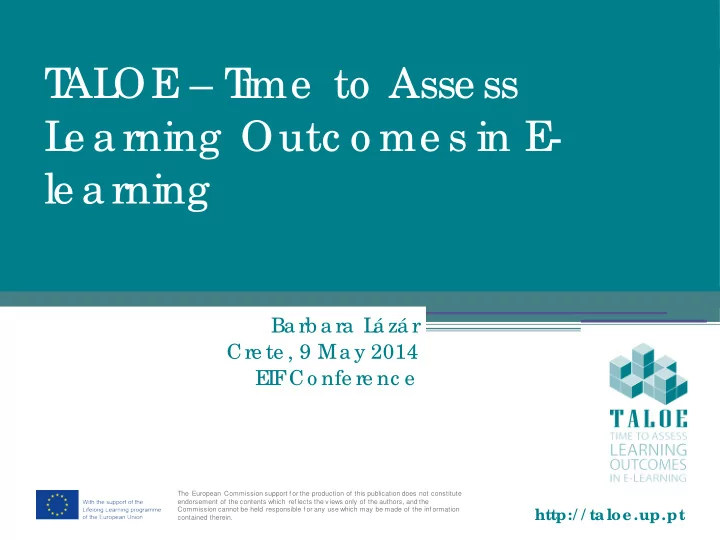

T AL OE – T ime to Asse ss L e a rning Outc o me s in E- le a rning Ba rb a ra L á zá r Cre te , 9 Ma y 2014 EIF Co nfe re nc e The European Commission support f or the production of this publication does not constitute endorsement of the contents which ref lects the v iews only of the authors, and the Commission cannot be held responsible f or any use which may be made of the inf ormation http:/ / ta loe.up.pt contained therein.
Aim a nd o b je c tive - Developing a web-based platform for teachers and trainers in e-learning to help them decide on the e-assessment strategies used on their course or module. - The teacher will describe the learning outcomes of the course, then the TALOE platform will analyse them and provide an e-assessment strategy that is consistent with the course. The European Commission support f or the production of this publication does not constitute endorsement of the contents which ref lects the v iews only of the authors, and the Commission cannot be held responsible f or any use which may be made of the inf ormation http:/ / ta loe.up.pt contained therein.
Spe c ific g o a ls - T o esearch and select innovative e-assessment practices that take advantage of the use of technology - T o develop a web-based tool that is easy to use by the stakeholders - T o test the implementation of the tool with real case studies - T o distribute and disseminate the TALOE tool among the communities of stakeholders The European Commission support f or the production of this publication does not constitute endorsement of the contents which ref lects the v iews only of the authors, and the Commission cannot be held responsible f or any use which may be made of the inf ormation http:/ / ta loe.up.pt contained therein.
Ma in ta rg e t g ro ups – prima ry Teachers and trainers from all levels of education: they may use the TALOE tool to define e-assessment strategies for their courses or modules. The European Commission support f or the production of this publication does not constitute endorsement of the contents which ref lects the v iews only of the authors, and the Commission cannot be held responsible f or any use which may be made of the inf ormation http:/ / ta loe.up.pt contained therein.
Ma in ta rg e t g ro ups - se c o nda ry • Researchers dealing with Learning Outcomes and e-assessment • Recognition and accreditation staff may use TALOE to verify the validity of assessment methods of prior learning or to provide evidence for accreditation of programmes • Programme developers may use TALOE to define e-assessment strategies recommendations for new online programmes • Decision makers may use TALOE to define valid e-assessment strategies for their institutions • Networks and initiatives operating in the fields of LOs, assessment, vocational training, higher education, continuing education and recognition and accreditation The European Commission support f or the production of this publication does not constitute endorsement of the contents which ref lects the v iews only of the authors, and the Commission cannot be held responsible f or any use which may be made of the inf ormation http:/ / ta loe.up.pt contained therein.
Se le c tio n c rite ria fo r the e -a sse ssme nt pra c tic e s Be designed to measure the achievement of the intended learning outcomes and other course/programme objectives; Be appropriate for their purpose, whether diagnostic, formative of summative; Have clear and published criteria for marking; Where possible, not rely on the judgements of single examiners; Assess more holistic, complex activities using knowledge and skills in problem-solving or authentic tasks; The European Commission support f or the production of this publication does not constitute endorsement of the contents which ref lects the v iews only of the authors, and the Commission cannot be held responsible f or any use which may be made of the inf ormation http:/ / ta loe.up.pt contained therein.
Se le c tio n c rite ria fo r the e -a sse ssme nt pra c tic e s Use a diverse range of assessment methods, resulting in qualitative descriptions or judgements; Integrate assessment with teaching and learning and involve students as active participants; Identify and describe achievements according to relevant criteria and standards. The European Commission support f or the production of this publication does not constitute endorsement of the contents which ref lects the v iews only of the authors, and the Commission cannot be held responsible f or any use which may be made of the inf ormation http:/ / ta loe.up.pt contained therein.
F urthe r info rma tio n a nd c o nta c t Thank you for your kind attention! The European Commission support f or the production of this publication does not constitute endorsement of the contents which ref lects the v iews only of the authors, and the Commission cannot be held responsible f or any use which may be made of the inf ormation http:/ / ta loe.up.pt contained therein.
Recommend
More recommend